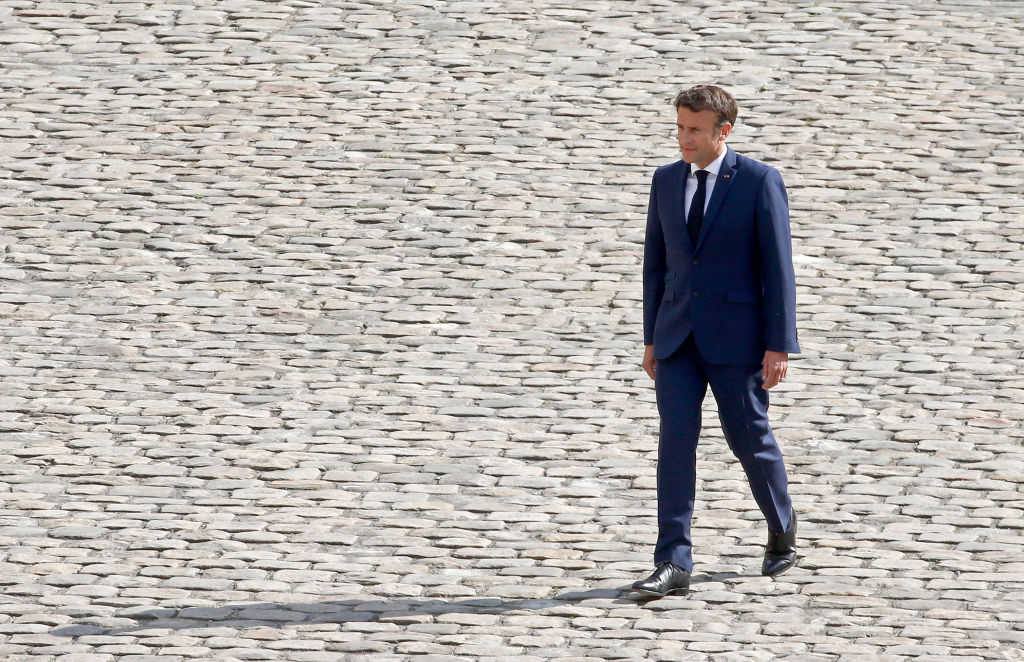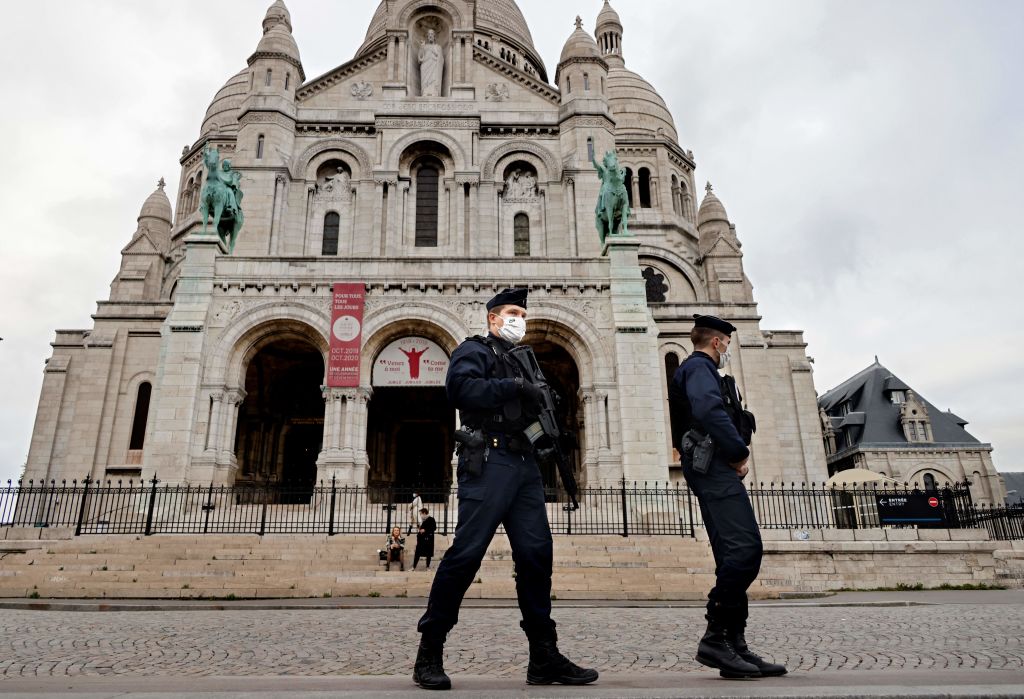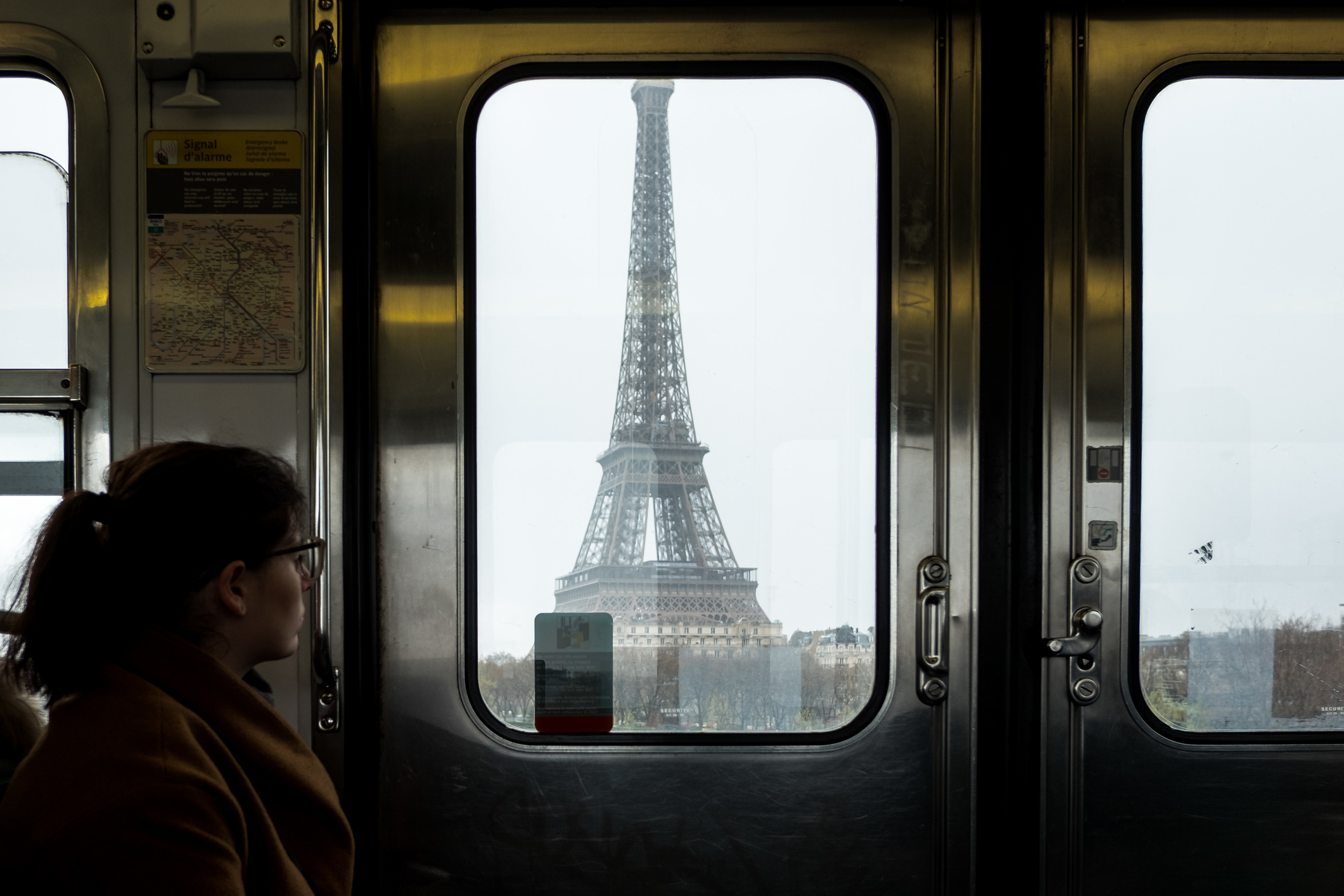Twenty French generals implore the government to take a firm hand against chaos.
Macron’s Tepid Triumph

France deserves better than a politics of technocratic Europhilia.
If one relies on mainstream news sources, it is well nigh impossible for Europeans and Americans to understand each other. The “dominant opinion,” as the French like to call it, divides the world into demagogic “populists” and responsible “moderates,” even if this lazy dichotomy is hardly more than a terrible simplification. I am not an admirer of Marine Le Pen but her “National Rally” (formerly the “National Front”) is not adequately described by the constant reiteration of slogans like “ultra-right” and “Putinist.” Indeed, it is not her father’s National Front and appeals to a much broader segment of the French electorate. The mainstream propensity to overstate the case suggests a fanaticism all its own.
Nor is President Emmanuel Macron’s technocratic centrism all that moderate in any robust sense of the term. Macron, who once strangely suggested that there is no such thing as French civilization, can hardly invoke French nationhood without appealing simultaneously to “European sovereignty.” To be sure, he keeps a copy of Charles de Gaulle’s War Memoirs close at hand and clearly has taken to the Olympian aspects of the presidency of the Fifth French Republic. But he owes more to the post-Western spirit of May 1968, now routinized and moderated, than to the unequivocal appeal to the honor and independence of the French nation represented by de Gaulle in his famous “Appeal” of June 18, 1940. Likewise, while Macron has no illusions about Islamic extremists (or “Salafists,”as he calls them), he still buys into the republican, secularist conceit that French Muslims can eventually become late-modern and spiritually indifferent individualists, wholly French.
Most importantly, he has no feel for, or affective attachment to, what Pierre Manent has called “the Christian mark” of France and Europe. To recognize that France is a nation of a “Christian mark,” with an accompanying republican political form and secular state, is to suggest to Muslims and secularists alike that France is much more than a postmodern spiritual empty space. France did not begin with the rather draconian separation of church and state in 1905. As the French novelist Michel Houellbecq sees so well, such a spiritually arid secularism effectively makes French Muslims the dominant spiritual force in the country, since they have a sense of common purpose sorely lacking among French Catholics, secularists, and Jews. As Christopher Caldwell has pointed out, 20 percent of the French armed forces are already Muslim.
However, Marine Le Pen, no more than Macron, can speak to the deeper spiritual and cultural soul of France. She is a statist in economics, a more than half-progressive on cultural and social issues, and a defender of French sovereignty in the most rough and inelegant way. She is largely correct about the limits of the centrist establishment’s heavy-handed approach to globalization, free trade, and economic reforms, hardly asking for (or caring about) the consent of the French people. But she is truly insensitive to the sclerotic character of France’s top-heavy bureaucratic state and the legitimate economic and moral merits of the market economy. Like almost everyone in France, liberalism is for her always “ultra-liberalism,” and capitalism is always “savage capitalism.” That caricature of the liberal tradition is shared by the vast majority on the French Left, and many soi-disant French centrists, too.
Macron won reelection in the second round of the French presidential elections on April 25, 2022 with a little over 58 percent of the vote. His was a victory of those looking for moderation (rightly or wrongly understood), “responsible” or reliable leadership, a commitment to European “values,” and a rejection of the “populism” espoused by Marine Le Pen. But it was also a victory for a technocratic, oligarchic, and largely spiritually vacant vision of France and Europe. Le Pen did significantly better (by 5 percentage points) than she had done in the final round of the 2017 French presidential election. That, together with roaring inflation and with Macron viewed as arrogant and aloof (“Napoleon IV”) by a significant part of the public, the appeal of the technocratic and Europeanist center is wearing thin. But Le Pen does not offer a prudent, responsible, or measured alternative to an increasingly insufferable status quo.
To complete the picture: the traditional “governing” parties of the French Fifth Republic completed the collapse that had already begun in the 2017 presidential and parliamentary elections, together taking less than 7 percent of the vote in the first round of the 2022 presidential elections. The Socialists were initially discredited by the ineffectual presidency of François Hollande (a presidency, a bit like Biden’s now, that went into irreversible freefall) and a growing sense among its natural base that it had abandoned what was left of the French working class to become an uncritical voice of technocracy and “European values”; in this way, hardly distinguishable from its opponents on the center-right of the French governing divide.
The Républicains, the Republicans, the latest incarnation of the so-called neo-Gaullists, had a fighting chance of winning with François Fillon as their candidate in 2017. Fillon, a practicing Catholic, combined moderate conservatism, reservations about the European Behemoth, and prudent support for salutary economic reforms. Importantly, he had a natural constituency. But his candidacy was sabotaged by targeted leaks from the press, drawing attention to the fact that he had helped his wife get a highly paid no-show job on his staff. Later he was charged and convicted of embezzlement and may face a brief stint in prison. This time the Republicans were burdened with a much weaker candidate, Valérie Pécrasse, who stumbled from the gate and failed to inspire. But the so-called neo-Gaullists were burdened with a bigger problem. They had for a very long time now become a “European” party, only paying lip service to its distant Gaullist origins. Americans of a certain generation may remember Charles Péguy’s profound observation that “mystique” (an inspired and principled vision of politics and statecraft) all too readily collapses into “politique” (a petrified approach to public life that puts political self-preservation and tired clichés above everything else). That certainly applies to the not so Gaullist neo-Gaullists.
Like Macron, les Républicains had a difficult time speaking about France to France. They nod in that direction from time to time, but in practice they make “Europe” the alpha and omega of political life. Neither truly liberal on economic matters, nor anti-liberal either, their incoherent message has a hard time resonating with even “bourgeois” voters. But for a time they were perhaps France’s best hope for combining political responsibility with patriotic attachment and some meaningful deference to the “Christian mark” of France.
As for the brilliant but erratic journalist Eric Zémmour, his emphasis on civilizational issues, including the threat of radical Islam and the massive erosion of French sovereignty, resonated less with voters than Marine Le Pen’s strategic decision to concentrate on bread-and-butter issues. He was certainly not helped by the endless assaults that came his way from a press committed to defining Zémmour, an elegant if sometimes bombastic writer and popular historian, and a French patriot and Jew, as an antisemite, islamophobe, and, ever so predictably, an “ultra-rightist.” As some commentators have suggested, his strenuous effort to appeal to the middle-class base of the Republicans undoubtedly hurt him as well with angry populist voters. Perhaps Zémmour’s ill-fated campaign suggests the limits of men and women without any political experience whatever running for the highest office in the land. Political experience matters more than most populists are willing to acknowledge.
With the continued collapse of the old establishment parties, the public space in France is increasingly dominated by Macron’s technocratic and largely postpolitical vision (which, truth be told, is not totally disconnected from a residual if real moderation and good sense), and the rabid leftism of Jean-Luc Mélénchon, whose Party of the Left (renamed of late France Insoumise, “France Unbowed”) is pursuing a unity pact with the Greens, Socialists, and Communists for the upcoming parliamentary elections in June. Mélénchon, a self-described “historical materialist,” received 22 percent of the vote in the first round of the presidential election, and no less than 70 percent of the Muslim vote. As Pierre Manent put it in an illuminating interview in Le Figaro on April 27, 2022, Mélénchon knows exactly what he wants: a “new” people uniting French Muslims, extreme progressivist or woke opinion, and the not inconsiderable “extreme Left” in France “which maintains an inconsolable nostalgia for violent revolutions, or at least the barricades” of 1968. But to make the people anew is an essentially tyrannical project. Mélénchon is far more estranged from the old France (Christian and republican) than the other major candidates and poses an authentic danger to French liberty and identity.
As Giulio de Ligio and Phillippe d’Irbarne have suggested, none of these candidates truly speaks for French Catholics, 40 percent of whom voted for “extrême-droitiste” candidates, 30 percent for Macron, and 20 percent for the historical materialist Méléchon. D’Irbarne in particular has argued that the French Catholic church is torn between the humanitarian church, the Church of Bergoglio, committed to open borders, anti-populism, an aversion to conversion (or even efforts at evangelization), and a full accommodation to contemporary mores, sexual or otherwise. This is the left-wing party at prayer. Another part of the Church, still more numerous among the remaining faithful, supports a more traditional faith, with a yearning for French nationhood and a respect for traditional mores. No one, alas, speaks for them.
This, of course, is not the first time that France has been fragmented and its prospects dim. History may provide hope and guidance. Perhaps a liberal conservative political option will arise in the midst of the present confusion, representing the best of France and Europe. For surely the France worth preserving did not begin in May 1968, with a generalized “culture of repudiation.” Somebody must learn how to speak effectively and persuasively in favor of the continuity of Western civilization and a France that did not begin a generation ago. That France would proudly represent the best of both the republican and Catholic traditions, the two wings of a still residually proud nation.
The American Mind presents a range of perspectives. Views are writers’ own and do not necessarily represent those of The Claremont Institute.
The American Mind is a publication of the Claremont Institute, a non-profit 501(c)(3) organization, dedicated to restoring the principles of the American Founding to their rightful, preeminent authority in our national life. Interested in supporting our work? Gifts to the Claremont Institute are tax-deductible.
Social justice with a French accent
Foreign threats demand a muscular domestic response.



